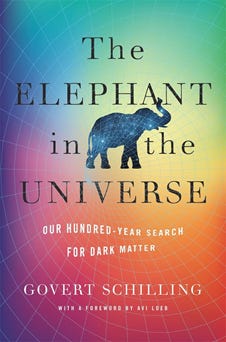You know the ancient Indian parable: a group of blind men come across and elephant for the first time. Except they don’t know what an elephant is and can’t see it. Each man touches a different part of the elephant – its leg, its trunk, its tail – and each come to a different conclusion about what the mysterious creature is. Dark matter is a bit like this.
The aptly named, The Elephant in the Universe: Our Hundred-Year Search for Dark Matter by Govert Schilling, tells scientist’s stories of how they are working to understand the whole “elephant”, dark matter, in our universe.
Dark matter and dark energy – the mysterious, elusive stuff that makes up about 95% of our universe – is one of the biggest problems in physics today. Scientists across the world are devising clever experiments to try and detect and understand what dark matter (and energy) is and how it fits within the bigger picture of known physics.
The problem is, no one can seem to actually figure out how to detect it directly, because, well, we can’t see it. It’s dark, not luminous like the matter we can see, such as the matter in the photo of this post. We seem to know that it exists though, based on a mounting body of indirect evidence, calculations, and theoretical models that necessitate it exists. Though some scientists posit tantalizing theories that assume dark matter doesn’t exist, such theories demand too much change to current models that have mountains of direct evidence, as Schilling explains.
The Elephant in the Universe is a 100-year review of what the world’s brightest minds have figured out so far about this mysterious thing is that seems to fill our entire universe. And the search for dark matter is heating up — ever larger, more complex, and more sensitive experiments are being done each year, and Schilling takes you into the labs of those on the cutting edge of science that will hopefully detect the elusive matter soon.
I really enjoyed this book. I try to read a couple physics books a year, and this is a great one for folks interested in the topic. While there is some jargon and technicalities (it is physics after all!), it’s a well written, accessible book for folks with an interest in science.
Published: May 2022
Format: Hardcover
If you think this sounds interesting, bookmark these other great reads
Vera Rubin: A Life by Jacqueline Mitton and Simon Mitton (2021)
The End of Everything (Astrophysically Speaking) by Katie Mack (2021)
This post contains affiliate links, allowing me to earn a small commission when you purchase books from the link provided. There is no cost to you, and this will allow me to keep this newsletter free and open to all. Happy reading!





